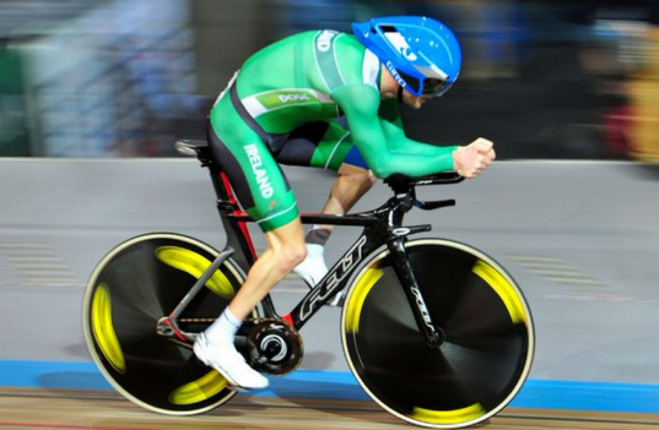EOGHAN CLIFFORD ONLY started his paracycling career in 2014 and immediately made his mark by taking gold in the Men’s C3 Road Race at the UCI Paracycling Road World Championships.
He followed it up in 2015 and 2016 with gold in the Men’s C3 Time Trial in the UCI Paracycling Road World Cup.
Clifford — a member of the An Post Irish Paracycling Team — lives with the degenerative muscle disease, Charcot-Marie-Tooth but still races at a national level in able-bodied events.
Here, the NUI Galway lecturer talks about the day that changed his cycling career:
******
“I know a lot of people would probably say winning a world championships but I’d like to go back to a race where I made a particular mistake that, I think, has completely changed the way I race since.
“For as long as I’d been racing, I’d never really learned to trust my gut but I was doing some racing in Norway in 2006. I was taking part in the Jotunheimen Rundt, one of the longest and most demanding one-day races in the world.
“It’s 432km long, open to any national level cyclist. The race starts in the evening and keeps going through the night. It’s quite a big race.
“About 160km into the race, it had split up all over the place. I was in a group of about 20 and we were at the lead end of the race and a couple of guys attacked out of our group and I had a decision to take.
“I knew I was on a ‘good day’ as they say and I knew I could go with them. However, there was well over 200km to go so I thought to myself ‘it’s a bit early to go with them’ and because we were in a bigger group behind, we could work together to catch them before the end.
“They pulled out a big gap, about 15 or 20 minutes because there was absolutely no co-operation within our group and, with about 100km to go, I figured that I still had really good legs and if I didn’t try to do something, the race was gone.
“So I attacked out of my group and managed to chop down the attack to the leading five or six riders from a 15 minute lead to a five minute lead at the finish but, because I was on my own, I just couldn’t do any more.
“I came in sixth and I was completely gutted because it was one of those days that I knew from the moment I sat on the bike I could win the race but I didn’t trust myself.
“The impact of that though was that when I came back to Ireland I took part in the Connacht Championships which, might not sound like a big race, but there was a lot of high quality riders in it and I completely changed my style of racing.
“I just had a lot more confidence and belief and, instead of waiting for the race to happen, I started attacking a lot more and getting out there in races and the results started happening.
“I won Connacht on my own from a solo break that year and won it the next year from a solo break 100km out and I just banked a lot of good results over the next few years.
“For me, it was a lesson that, as an athlete, you just need to trust yourself, trust your ability and when your legs are telling you to go, don’t listen to your head or the cautious side of you that’s maybe telling you to wait.
“In my job, I’m an engineer and that means I have to be very logical but now, as an athlete, when I race with my gut I get better results but when I try to be tactical, when I over-analyse a race, I don’t tend to do as well as I could do.
“I’m hopefully going to be cycling for Ireland at the Paralympics on the track but I race able-bodied races too and, to be honest, sometimes tactics have to play a part but when you’re racing some of the top guys at that level you do have to be a bit more cautious otherwise you will get a complete kicking altogether.
“The transition between the able-bodied and paracycling events is second nature at this stage with the only difference being the para-events tend to be quite a bit shorter which probably doesn’t reflect the ability of the guys I’m racing against.
“The fields are also a bit smaller but, on the other hand, that’s only because the best two or three guys from each country are qualified to race so you really are racing guys who could compete anywhere.
“I’m riding the An Post Tour de Burren and the week after I’m racing the able-bodied national championships against the likes of Dan Martin and Nico Roche so that’ll be interesting.
“After that I’ve the Paracycling World Cup in Spain and then training camps for the rest of the summer. We’re based in Majorca so I’d like to get in some racing when I’m there, both on the track and the road.
“For me, I find training a bit of chore but, in a race, things tend to flow a bit better.”
For a fun day out or a serious challenge join the Irish Paracycling Team on their social training spin at An Post Tour de Burren on 18 June and the last chance to sign up online is midnight, Wednesday 15 June.
The route includes the Wild Atlantic Way, the Burren GeoPark and the World Geological Heritage Site of the Burren and was voted Cycling Ireland Leisure Event of the Year in 2014, and won the European Sports Tourism Award in 2015.


